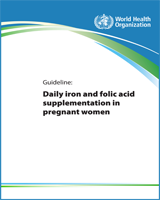It is estimated that 41.8% of pregnant women worldwide are anaemic. At least half of this anaemia burden is assumed to be due to iron deficiency. Member States have requested guidance from the World Health Organization (WHO) on the effectiveness and safety of daily iron and folic acid supplementation in pregnant women as a public health measure to improve pregnancy outcomes in support of their efforts to achieve the Millennium Development Goals.
WHO developed the present evidence-informed recommendations using the procedures outlined in the WHO handbook for guideline development. The steps in this process included: (i) identification of priority questions and outcomes; (ii) retrieval of the evidence; (iii) assessment and synthesis of the evidence; (iv) formulation of recommendations, including research priorities; and (v) planning for dissemination, implementation, impact evaluation and updating of the guideline. The Grading of Recommendations Assessment, Development and Evaluation (GRADE) methodology was followed to prepare evidence profiles related to preselected topics, based on up- to-date systematic reviews.
The guideline advisory group for nutrition interventions, the Nutrition Guidance Expert Advisory Group, comprises content experts, methodologists, representatives of potential stakeholders and consumers. These experts participated in several WHO technical consultations concerning this guideline, held in Geneva, Switzerland, and in Amman, Jordan, in 2010 and 2011. Members of the External Experts and Stakeholders Panel were identified through a public call for comments, and this panel was involved throughout the guideline development process. Guideline advisory group members voted on the strength of the recommendation, taking into consideration: (i) desirable and undesirable effects of this intervention; (ii) the quality of the available evidence; (iii) values and preferences related to the intervention in different settings; and (iv) the cost of options available to health-care workers in different settings. All the members of the guideline advisory group completed a Declaration of Interests Form before each meeting.
Daily oral iron and folic acid supplementation is recommended as part of the antenatal care to reduce the risk of low birth weight, maternal anaemia and iron deficiency (strong recommendation). The overall quality of the evidence for iron supplementation versus no iron was moderate for low birth weight, preterm birth, maternal anaemia at term and maternal iron deficiency at term. The evidence was of low quality for birth weight, neonatal death, congenital anomalies, maternal death, maternal severe anaemia, and infections during pregnancy; whereas it was of very low quality for side-effects.

